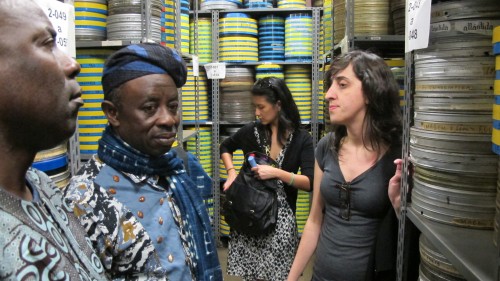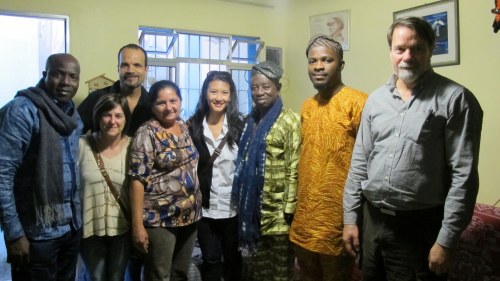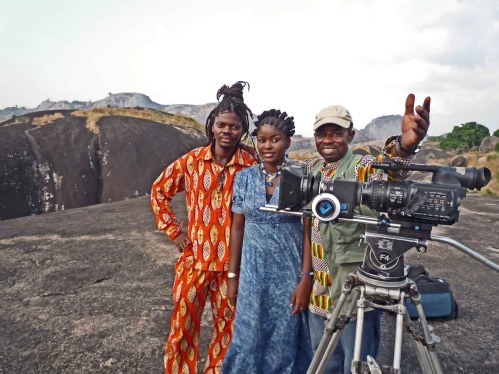After a 20-hour journey from Lagos via Johannesburg, we arrived in São Paulo, Brazil on Thursday 17 November 2011 to celebrate the inaugural edition of the Bem-vindo a Nollywood Film Festival – honoring the works of veteran director Tunde Kelani. The Nigerian delegation consisted of me, Kelani, Ma’ami production manager Jamiu Shoyode, and Arugba and Ma’ami associate producer Hakeem Adenekan. Nollywood expert Prof. Jonathan Haynes graciously paused his Guggenheim Fellowship work to join us from New York.

Arriving at the Cine Olido, the main site of the "Bem-vindo a Nollywood" Film Festival in São Paulo, Brazil. © 2011 Mainframe Film & TV Productions
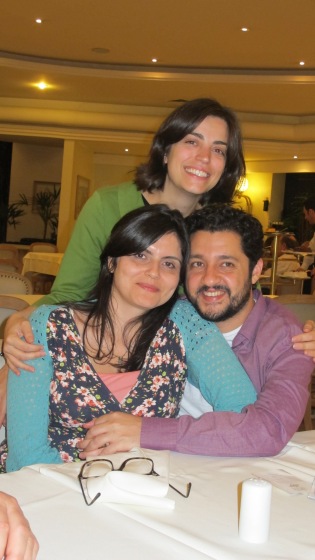
The Brazilian coordinators (counterclockwise): Vanessa Lopes, Roberta Astolfi, Alex Andrade at the welcome dinner. © 2011 Mainframe Film & TV Productions
Olusegun Michael Akinruli, founder of the Instituto de Arte e Cultura Yoruba, met us at the airport and became our knowledgeable guide for the first few hours in São Paulo. From the beginning, the trip was meticulously orchestrated by my Brazilian co-curator, Alex Andrade of Kinopedia Ltd, and his associates, Vanessa Lopes and Roberta Astolfi.

Meeting with José Roberto Sadek, Secretary of Culture of the City of São Paulo. © 2011 Mainframe Film & TV Productions
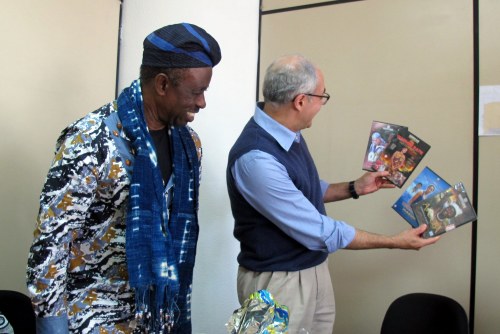
José Roberto Sadek, Secretary of Culture of the City of São Paulo, displays his gift from Kelani of Mainframe classics. © 2011 Mainframe Film & TV Productions
The next morning, we met with José Roberto Sadek, the Secretary of Culture of the City of São Paulo. Along with the Cine Olido – the Festival’s main venue – he also oversees 12 theaters, 60 libraries, and approximately 600 cultural programs per month. Sadek applauded the Nollywood financing model for its “accountability to the audience”. Since most Brazilian films receive government funding, filmmakers don’t feel the need to make a profit and follow popular tastes.

Eder Mazine (far right), President of the São Paulo Film Commission, presents gifts to Hakeem Adenekan and Tunde Kelani. © 2011 Mainframe Film & TV Productions

L-R: Hakeem Adenekan, Tunde Kelani, Eder Mazine, Jamiu Shoyode, Bic Leu, Jonathan Haynes, Film Commission rep, Alex Andrade at the Cine Olido. © 2011 Mainframe Film & TV Productions
Next, we encountered Eder Mazine, the President of the São Paulo Film Commission. Mazine emphasized the need to attract more foreign productions, such as Nollywood, to the city as film shoots engender economic growth by creating widespread employment.
After that, we were treated to a comprehensive tour of the Cinemateca Brasileira, the second Festival venue and the largest film archive and audiovisual conservation center in Latin America. The Cinemateca is housed in the renovated municipal slaughterhouse, where specialists conserve and restore foreign and national films produced since 1895. The institution is home to an astounding 250,000 rolls of film and 35,000 titles; its library boasts over 23,000 items. To my Nigerian colleagues, the most amazing discovery was that the public could access everything that the Cinemateca offers for free in perpetuity.

With Tunde Kelani at the cinema inside the Cinemateca Brasileira. © 2011 Mainframe Film & TV Productions
The tour of the Cinemateca confirmed to me that all I have done has been worthwhile. I may not be rich in the material sense, but I now realize the importance of going back to rescue what I have done and what the [Nigerian film] industry has done. — Tunde Kelani

Tunde Kelani with filmmaker Abel Success Erebe (far left) at the premiere of "Ma'ami" at the Cine Olido. © 2011 Mainframe Film & TV Productions
The evening ended with the official Brazilian premiere of Ma’ami, hosted by our friends at the Secretary of Culture at the Cine Olido. Prominent Nigerian-Brazilians attended to pay respect to Kelani, including Abel Success Ebere, director of Black Night in South America (2007).
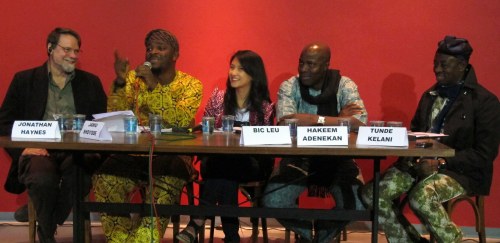
L-R: Jonathan Haynes, Jamiu Shoyode, Bic Leu, Hakeem Adenekan, Tunde Kelani. © 2011 Mainframe Film & TV Productions
The second day began with me moderating a roundtable discussion on current issues in Nollywood at the Cine Olido – featuring Kelani, Haynes, Shoyode and Adenakan. The topics ranged from funding and distribution to location management and international diffusion of Nollywood films.

Festival co-curator, Alex Andrade, poses a question on Nigerian film preservation. © 2011 Mainframe Film & TV Productions
One of the most thought-provoking questions came from my co-curator, Alex Andrade, who asked about the preservation efforts of Nigerian films and “what we can do to ensure that we see the movies that you make.” Kelani and Haynes both agreed that an ideal Brazilian-Nigerian partnership would consist of the Cinemateca Brasileira managing the technical training of archiving and preservation and a private sector player, such as oil and gas giant Petrobras, providing the funding. Perhaps this initiative will get kick started by the next annual edition of the Festival.

A performance by the Orquestra de Berimbaus at the Centro Cultural da Juventude. © 2011 Mainframe Film & TV Productions
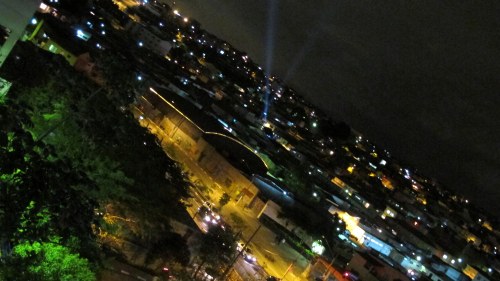
View of São Paulo at night from the Centro Cultural da Juventude. © 2011 Mainframe Film & TV Productions
After the discussion, the delegation took a break to enjoy a performance by the Orquestra de Berimbaus at the Centro Cultural da Juventude.
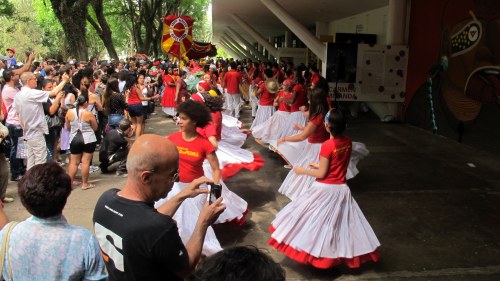
National Black Consciousness Day celebration at the Museu Afro Brasil. © 2011 Mainframe Film & TV Productions
Our last full day on 20th November coincided with the National Black Consciousness Day (Dia da Consciência Negra). As such, we visited the Museu Afro Brasil, where a full-fledged celebration featured a food festival and a live concert, which eventually invaded the pristine halls of the Museum.

"Metrópolis" interviews Kelani outside the Polo Cultural de Heliópolis. © 2011 Mainframe Film & TV Productions

"Metrópolis" interviews Kelani outside the Polo Cultural de Heliópolis. © 2011 Mainframe Film & TV Productions

Community leaders lead us on a tour of the Heliópolis favela. © 2011 Mainframe Film & TV Productions

Community leaders lead us on a tour of the Heliópolis favela. © 2011 Mainframe Film & TV Productions
Later on that afternoon, we toured Heliópolis, the largest favela (or shantytown) in Brazil – home to 190,000 people. Rising above its poverty and infrastructural challenges, Heliópolis is a success story of community organization. In 2007, community leaders successfully petitioned the Municipality of São Paulo and the State Government to fund the construction of an education and cultural center (and the third venue of the Festival). Built by renowned architect Ruy Othake, the center includes a gallery, a theater, and classrooms for over 2,000 students.

Heliópolis community leader (right) presents Kelani with a gift. © 2011 Mainframe Film & TV Productions
Touched by the perseverance of the Heliópolis residents and community leaders, Kelani declared the tour of the favela and the subsequent screening of Ma’ami in the community theater as “the happiest moments of my life.”

With my Brazilian co-curator, Alex Andrade, at the Polo Cultural de Heliópolis. © 2011 Mainframe Film & TV Productions
I feel extremely fortunate that my Nollywood immersion has come full circle. After being introduced to Nigerian cinema in Jonathan Haynes’ Long Island University office, my education was cemented on the set of Tunde Kelani’s Ma’ami in Abeokuta in October 2010 – just two weeks after my arrival in Nigeria on the Fulbright grant. I am so honored to complete my Nollywood research with these two amazing individuals, as well as be joined by new friends who have supported me along the way – Alex Andrade, Jamiu Shoyode and Hakeem Adenekan.
***
Press coverage (Nigeria):
- Celebregion.com, 5 November 2011
- Daily Times Nigeria, 4 November 2011
- E24-7 Mag, 13 November 2011
- The Nation, 29 October 2011
- Nigerian Compass, 24 November 2011
- Punch, 9 November 2011
- Supple Magazine, 27 October 2011
- ThisDay, 13 November 2011
- Tribune, 12 November 2011
Press coverage (Brazil):
- Aurora de Cinema Blog, 2 November 2011
- Bem Parana, 1 December 2011
- Diario de S. Paulo, 5 November 2011
- Diario do Grande ABC, 19 November 2011
- Jornal Pequeno, 30 November 2011
- LeiaJa, 7 November 2011
- Metropolis (TV), 22 November 2011
- Pernambuco.com, 5 November 2011
- Raca Brasil, 1 November 2011
- Rede Brasil Atual, 5 November 2011
- Revista iN, 7 November 2011
- Ultimo Segundo, 19 November 2011
- Unegro, 6 November 2011
- Universidade livre feminista, 9 November 2011
- Vermelho, 9 November 2011
